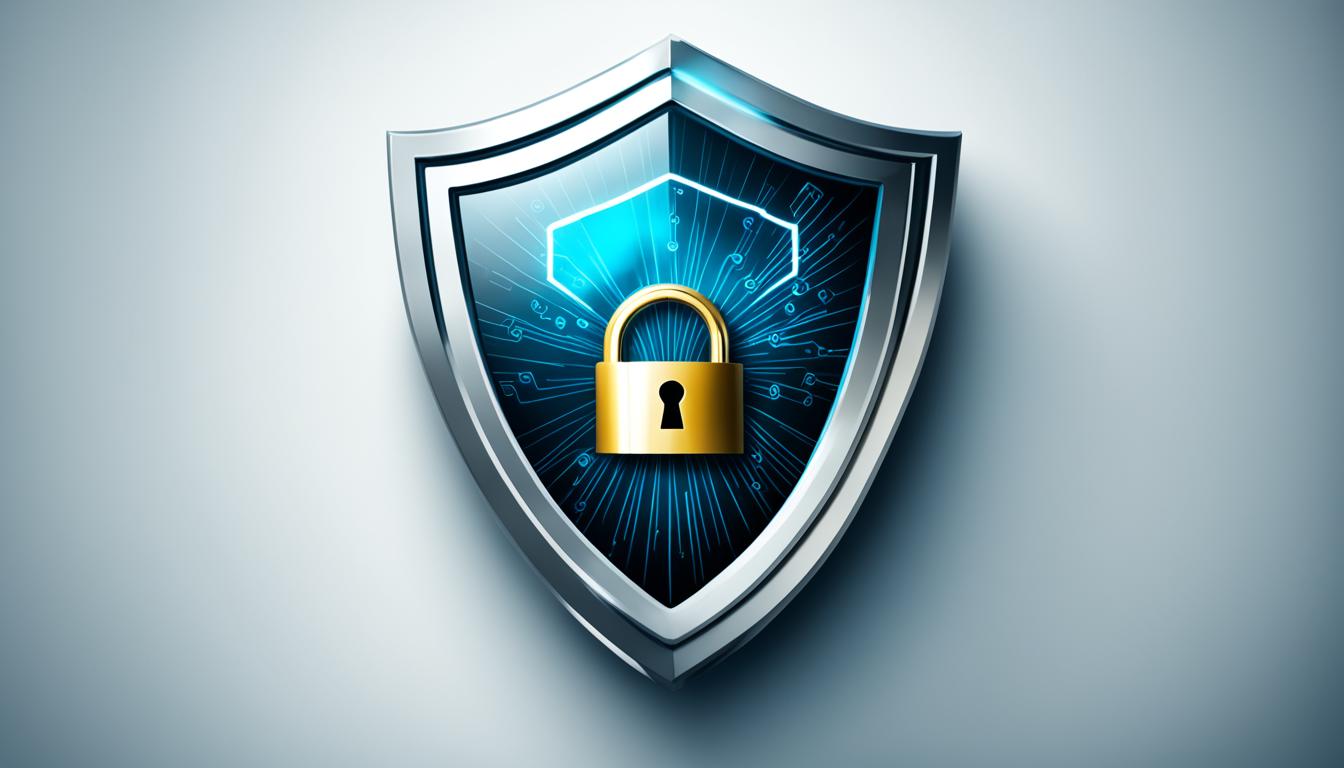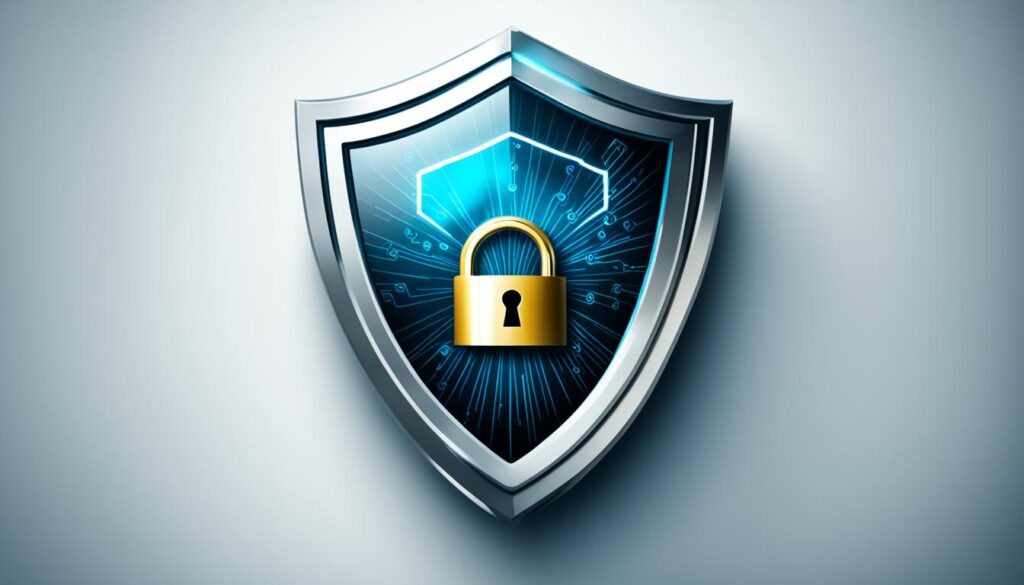Cybersecurity for Dummies: Protect Yourself Online

Cybersecurity for Dummies: Protect Yourself Online
In today’s digital world, cybersecurity is key. We use technology more and more, so keeping safe online is vital. If you’re new to cybersecurity, don’t worry. Our “Cybersecurity for Dummies” guide is here to make online security easy to understand. Have you ever wondered how to keep your info safe from hackers or stop malware from infecting your devices?
This guide covers the basics of cybersecurity. We’ll talk about common cyber threats and how to protect your network. It doesn’t matter if you’re tech-savvy or just starting with digital security. This article will give you the knowledge and tools to keep you and your loved ones safe online.
Key Takeaways
- Discover the essential cybersecurity basics to safeguard your online presence.
- Identify and defend against common cyber threats, including malware and phishing scams.
- Learn how to set up a secure home network and protect your data from unauthorized access.
- Explore password best practices and effective password management strategies.
- Understand the importance of software updates and staying vigilant against emerging threats.
Understanding Cybersecurity Basics
In today’s world, cybersecurity is key to our daily lives. It’s about keeping our devices, networks, and online info safe from hackers and thieves. Knowing the basics of cybersecurity helps us stay safe online and protect our personal and work data.

What is Cybersecurity?
Cybersecurity is all about keeping electronic systems, networks, and data safe from bad guys. It uses technology, rules, and good habits to fight cybercrime and protect our online info.
Read More: What is Cybersecurity? Types, Threats, and Cyber Safety Tips
Why Cybersecurity Matters
- It keeps our info safe: Cybersecurity protects our private data, like bank details, health records, and messages.
- It fights cybercrime: By using security measures, we can stop attacks like malware, phishing, and hacking that can harm us or our businesses.
- It keeps us safe online: Cybersecurity helps us surf the web safely, keeping our online privacy and digital tracks private.
- It helps businesses stay open and manage risks: For companies, cybersecurity is crucial for keeping things running smoothly, protecting their secrets, and handling the risks of going digital.
Learning about cybersecurity basics helps us all take steps to stay safe online. It helps us fight cyber threats and keep our digital world secure.
Common Cyber Threats Explained
In today’s digital world, cyber threats are a big worry for both people and companies. It’s important to know about threats like malware, viruses, and phishing scams. This knowledge helps protect your privacy and keeps your online world safe.
Malware and Viruses
Malware means harmful software. Viruses are a type of malware that can harm your device or network. They can steal your data and mess with your system. These threats spread through things like infected files, websites, or email attachments.
That’s why it’s key to use antivirus essentials and keep your software updated.
Read More: What is Malware? Malware Definition, Types, and Protection
Phishing Scams
Phishing scams are sneaky ways cybercriminals try to get you to share private info. They might send fake emails and texts or make fake websites that look real. Being careful and checking if messages are real can help keep your privacy protection safe.
It’s vital to stay updated and take steps to keep your online life secure. Knowing about common cyber threats helps you spot and fight them. This way, you can protect your digital world.
Read More: What Is Phishing? – Definition, Types of Attacks, Examples
Network Security Fundamentals
Keeping your network safe at home or in the office is key today. Cyber threats like malware and phishing scams can harm your privacy and data. Learning about network security helps you protect your digital stuff.
Setting up your firewall right is a key step. Firewalls watch and control what goes in and out of your network. By setting your firewall right, you can stop hackers from getting to your devices and info.
Your router is also important for security. It connects you to the internet, and its settings help keep your online life safe. Make sure your router has strong passwords and encryption to keep cybercriminals out.
There are more ways to keep your network safe. Update your software and systems often, use two-factor authentication, and watch out for phishing scams. These steps help keep your network secure.
Using these security steps can lower the risk of cyber threats. It helps keep your online privacy and data safe. Always stay informed and proactive to keep your network secure in today’s digital world.
Read More: What is Network Security? Definition, Importance, and Types
Cybersecurity for Dummies
In today’s digital world, keeping your online life safe is key. Cybersecurity for beginners means learning the basics and using simple steps to stay safe from cyber threats. By doing this, you can boost your defenses and lower the chance of getting hacked.
Being aware is a big part of staying safe online. Learn about common threats like malware and phishing scams to spot and dodge them. Keep up with updates for your software and systems to protect your devices and data.
Setting up strong network security is also vital. Make sure your home network is secure with a strong firewall and safe router settings. Also, think about using a VPN to make your internet use more private.
Keeping your data safe is super important. Have a plan to back up and recover your important stuff. Use cloud storage or external hard drives to keep extra copies of your data. This way, you can easily get back your data if you lose it or if there’s a cyber attack.
By following these easy yet powerful tips, you can take charge of your online safety. Remember, keeping your digital life secure is an ongoing task. Always be on your guard, update your software, and stay ahead in protecting yourself online.
Read More: Different Types of Cyber Security: A Comprehensive Guide
Key Cybersecurity Tips for Dummies
- Understand common cyber threats like malware and phishing scams
- Keep your software and operating systems up-to-date with the latest security patches
- Secure your home network with a strong firewall and router settings
- Implement a robust backup and recovery plan to protect your data
- Stay informed about cybersecurity best practices and regularly review your security measures
Creating Strong Passwords
In today’s digital world, online threats are common. Having a strong password strategy is key for your digital safety. It’s important to know how to make secure passwords to keep your accounts safe.
Password Best Practices
Here are some tips for making strong, unique passwords:
- Use a mix of uppercase and lowercase letters, numbers, and special characters to make your passwords hard to guess.
- Don’t use personal info like your name or birthdate, as hackers can easily find that.
- Make your passwords long and unique for each account to avoid easy attacks.
- Update your passwords often, especially for important accounts, to lower the risk of them being found out.
Password Manager Tools
Keeping track of many secure passwords can be hard. Luckily, there are tools to help. These tools create, store, and fill in your login info for you. Using a password manager boosts your password security and lowers the risk of online threats.
Good digital hygiene and secure passwords are key to protecting your online life. By following these tips and using password managers, you can keep your online accounts safe. This way, you can enjoy a safer digital experience.
Securing Your Home Network
In today’s digital world, keeping your home network safe from internet threats is key. A great way to protect your devices and data is by setting up your router and firewall right. Let’s look at how you can make your home network secure and protect your family from cyber dangers.
Router and Firewall Configuration
Your router is the key to your home network, so make sure it’s secure. Begin by changing the default administrator password to a strong, unique one. This stops unauthorized people from getting into your router’s settings. Then, turn on the firewall on your router to block potential hackers from getting in.
Also, keep your router’s firmware updated. Companies often release updates that fix security issues and make your router work better. Checking for and installing these updates can really boost the firewalls on your home network.
Using good antivirus software is also key to securing your home network. Antivirus programs can find and remove internet threats like malware, viruses, and spyware. Make sure your antivirus is always current to fight off the latest cyber threats.
By doing these things with your firewall setup and antivirus software, you can protect your home network. This keeps your family’s private info safe.
Protecting Your Data
In today’s digital world, keeping your data safe is key. This includes your stuff, money info, or important work files. Making sure your data is secure is a must. Using good backup and recovery plans helps protect your data from getting lost, stolen, or damaged.
Backup and Recovery Strategies
Having a solid backup plan is vital for keeping your data safe. You should back up your data to an external hard drive, a cloud service, or both. This way, you have your information safe from different threats like hardware problems or cyber-attacks.
Cloud storage is also great for keeping your data safe online. It lets you get to your files from anywhere and has strong security from trusted cloud providers. But make sure to pick a cloud service that meets your data safety needs.
Along with backups, having a plan for recovering your data is crucial in emergencies. This plan should tell you how to get your data back from backups. It helps you quickly get back to your important info.
By following these steps and online safety tips, you can lower the chances of losing, stealing, or damaging your data. This keeps your personal and work data safe from cyber threats.
Online Privacy and Safety Tips
In today’s digital world, keeping your online privacy and safety is key. This section offers tips to help you manage your digital footprint and avoid phishing scams. It aims to boost your internet security.
Start by being careful with your online privacy. Share less personal info on social media and online. Change your privacy settings to limit who can see your data. Be careful when sharing sensitive info online.
Watch out for phishing attempts to keep your online safe. Phishing scams use fake emails, messages, or websites to get your login details or other private info. Always check who sent something before clicking links or sharing personal info.
Privacy Protection Strategies
- Limit the personal information you share on social media and online platforms.
- Adjust your privacy settings to control access to your data.
- Use a virtual private network (VPN) to encrypt your online activities.
- Be cautious when providing sensitive information online.
Phishing Prevention Tips
- Verify the source of any suspicious emails, messages, or websites before engaging.
- Only click on links or download attachments from trustworthy sources.
- Use strong, unique passwords for all your online accounts.
- Enable two-factor authentication (2FA) whenever possible to add an extra layer of security.
By following these tips, you can lower the risk of cybercrime and keep your personal info safe. Stay alert and proactive to keep your digital life secure.
Read More: What is phishing in cyber security?
Keeping Up with Security Updates
In the world of cybersecurity, it’s key to stay on top of the latest updates. This keeps your devices and personal info safe. Cybersecurity rules and methods change often to fight new threats. So, updating your systems is vital for the best security.
Software and Operating System Patches
Creators of software and operating systems release patches and updates. These fixes address security issues and make your devices safer. Keeping your software and systems updated stops cybercriminals from getting into your systems without permission.
Here are some reasons to always update your software and systems:
- Patch vulnerabilities: Updates often fix security holes that hackers could use to attack your devices.
- Enhance security features: Updates can bring new security tools and make your systems more secure.
- Address emerging threats: New threats come up, and updates can protect you by adding the right security measures.
By regularly applying updates, you boost the cybersecurity of your devices and data. This reduces the chance of falling prey to cyber threats.
Conclusion
In this guide, we covered the key parts of cybersecurity for beginners. We looked at the basics, common threats, and how to protect your data and devices online.
Cybersecurity for dummies is more than just fighting off malware and phishing scams. It means securing your network with the right router and firewall settings. It also means using strong passwords with password managers and backing up your data safely.
Always put your online safety and data protection first as you use the internet. Keep your software and devices updated, and watch over your network security to avoid risks. By doing these things, you can have a safe and stress-free online life.
FAQ
What is cybersecurity, and why is it important?
Cybersecurity is about protecting your digital stuff and online actions from hackers and threats. It’s key today because we use the internet and connected devices for work and fun. Good cybersecurity keeps your info private, stops money loss, and lowers the chance of data breaches and cyber-attacks.
What are the most common cyber threats I should be aware of?
Watch out for malware like viruses and ransomware, phishing scams, data breaches, and identity theft. Malware can harm your devices and steal your data. Phishing tries to get you to share private info. Knowing about these threats and how to fight them is key to staying safe online.
How can I secure my home or office network?
Start by setting up your router and firewall right. Use strong, unique passwords and turn on encryption. Keep your router’s software updated. Think about using a VPN to encrypt your internet use. Check your network for weak spots and use antivirus software to protect your devices.
What are the best practices for creating and managing strong passwords?
Make strong passwords with a mix of letters, numbers, and symbols. Don’t use personal info or common words. Use a password manager to keep track of complex passwords safely.
How can I protect my data from loss or theft?
Use strong backup and recovery plans to keep your files safe. Look into cloud storage, external hard drives, or other backup options. Back up your data often and test your recovery to be ready for any data loss situation.
What are some tips for staying safe and protecting my privacy online?
Be careful with your info on social media, and use a VPN to hide your internet use. Watch out for phishing scams, and check your online accounts often. Manage your online presence well to keep your privacy safe.
Why is it important to keep my software and devices up-to-date?
Keeping your software and devices current is key for security. Updates often fix security problems. Installing these updates quickly helps protect your devices and data from new threats, keeping them as safe as possible.


